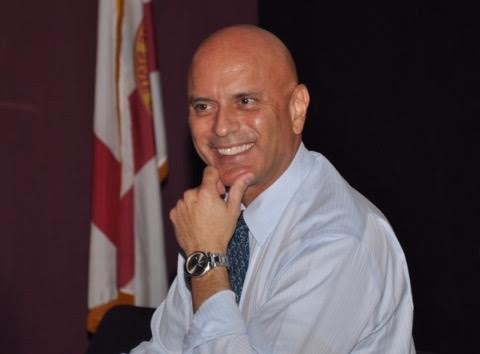For most of his career as an activist and law professor, Tim Canova was relegated to the political wilderness. He spoke out against Wall Street deregulation, the Federal Reserve, and corporate trade deals well before it was considered prudent to do so. In 2015, while taking part in the Citizens Trade Campaign against the Trans-Pacific Partnership, Canova grew critical of his local congresswoman, Debbie Wasserman Schultz, the only Democratic House member in Florida’s delegation to vote to fast-track the TPP and the chair of the Democratic National Committee. Within months, Canova would challenge Wasserman Schultz in the Democratic primary for her House seat in an epic David versus Goliath battle.
Canova received his A.B. degree from Franklin and Marshall College in Government and Economics, and his J.D. degree, cum laude, from the Georgetown University Law Center. Since 2012, he has been a Professor of Law and Public Finance at Nova Southeastern University Shepard Broad College of Law in Davie, Florida, where he teaches and writes in the areas of banking and financial services regulation, corporate governance, and international trade and finance. His work has been published under his professional name Timothy A. Canova in dozens of peer-reviewed journals, book chapters, monographs, newspapers, and magazines in the U.S. and overseas.
Canova previously taught at the Chapman University School of Law in Orange County, California, where he served as associate dean for academic affairs and the Betty Hutton Williams Professor of International Economic Law. He was first granted tenure at the University of New Mexico School of Law and has taught as a visitor at the University of Arizona College of Law and the University of Miami School of Law.
Prior to teaching, Canova served as a legislative assistant to the late U.S. Senator Paul E. Tsongas, practiced law in New York City with two large multinational law firms, and was a Swedish Institute Visiting Scholar at Stockholm University. While working on Capitol Hill, he began warning about the rise of Wall Street special interests and the assault on working families. In the 1980s, he wrote critically of the federal bailout of Continental Illinois, the nation’s seventh largest commercial bank, and the collapse of the savings & loan industry. In the 1990s, he opposed efforts to weaken the 1933 Glass-Steagall Act firewalls that had separated commercial banking from the risky securities markets. He was an early and consistent critic of the Federal Reserve under Alan Greenspan. Prior to the Asian currency contagion, he argued against the International Monetary Fund’s program of capital account liberalization. Throughout the 2000s, Canova cautioned about the rise of complex derivative financial instruments that were turning the United States into a “casino” economy. He warned of an impending crisis, pointed to the growing bubble in housing prices, and called for increased supervision of Wall Street banks and financial markets.
After the 2008 financial collapse, Canova emerged as a leading critic of the cozy relations between Washington and Wall Street that have corrupted our politics and distorted our economy. In 2011, he was selected by U.S. Senator Bernie Sanders to serve on an advisory committee on Federal Reserve reform along with such leading economists as James Galbraith, Robert Reich, Jeffrey Sachs, and Nobel Laureate Joseph Stiglitz. He also took part in the Occupy Wall Street movement in 2011, teaching a workshop on the Federal Reserve at the Occupy Los Angeles encampment.
In his 2016 congressional primary campaign, Canova used the New Deal slogan “Progress For All” to contrast his progressive agenda to the trickle down approach of corporate-dominated Democrats and Republicans. While the Democratic Party establishment — from the President of the United States down to the Broward Democratic Party — lined up behind Wasserman Schultz, along with a million dollar corporate Super PAC, Canova stayed true to his pledge to take only small donations and reject any corporate PAC money. His fierce challenge fell short — a shift of only 3000 votes would have turned the election his way — but in the process he broke all fundraising records for small donations in a House campaign, built the largest grassroots campaign for Congress in the country, and helped drive Wasserman Schultz from the DNC. The spirit and work of his campaign continues with Progress For All, our progressive grassroots organization supporting progressive causes and candidates throughout the country.

